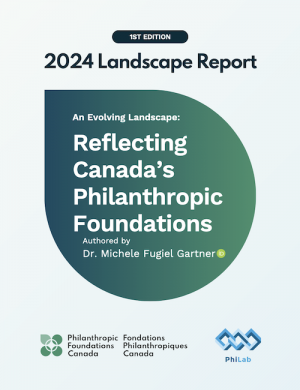 The 2024 Landscape Report: Reflecting Canada’s Philanthropic Foundations (from Philanthropic Foundations Canada and PhiLab) brings together previous literature and new information to provide an overview of foundations, such as “What do we know” (Chapter 1) and “What are the purposes, approaches, and roles of Canadian foundations” (Chapter 2). Regulation, asset investment and grantmaking are highlighted. PFC and PhiLab aim to release one report annually, starting with this 2024 Landscape report, which builds on PFC’s past research on foundation assets and giving trends.
The 2024 Landscape Report: Reflecting Canada’s Philanthropic Foundations (from Philanthropic Foundations Canada and PhiLab) brings together previous literature and new information to provide an overview of foundations, such as “What do we know” (Chapter 1) and “What are the purposes, approaches, and roles of Canadian foundations” (Chapter 2). Regulation, asset investment and grantmaking are highlighted. PFC and PhiLab aim to release one report annually, starting with this 2024 Landscape report, which builds on PFC’s past research on foundation assets and giving trends.
 Evaluating Advocacy for Developing, Adopting and Implementing Public Policy: A Collection of Resources, by Mark Cabaj (Oct. 2024), is for the Max Bell Foundation and its prospective and actual grantees — and is useful for anyone interested in planning and assessing public policy advocacy efforts. The document provides links and resources for methods and techniques to assist organizations and networks to monitor and evaluate their efforts to influence public policy decisions and implementation.
Evaluating Advocacy for Developing, Adopting and Implementing Public Policy: A Collection of Resources, by Mark Cabaj (Oct. 2024), is for the Max Bell Foundation and its prospective and actual grantees — and is useful for anyone interested in planning and assessing public policy advocacy efforts. The document provides links and resources for methods and techniques to assist organizations and networks to monitor and evaluate their efforts to influence public policy decisions and implementation.
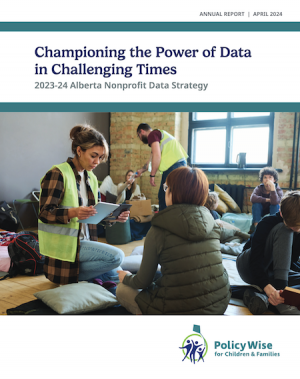 Funded by the Edmonton Community Foundation and supported by PolicyWise for Children & Families, the eight-page Championing the Power of Data in Challenging Times: 2023-2024 Alberta Nonprofit Data Strategy combines previous information and current analyses to provide a basic overview about the nonprofit sector’s impact in Alberta, as well as challenges and priorities.
Funded by the Edmonton Community Foundation and supported by PolicyWise for Children & Families, the eight-page Championing the Power of Data in Challenging Times: 2023-2024 Alberta Nonprofit Data Strategy combines previous information and current analyses to provide a basic overview about the nonprofit sector’s impact in Alberta, as well as challenges and priorities.
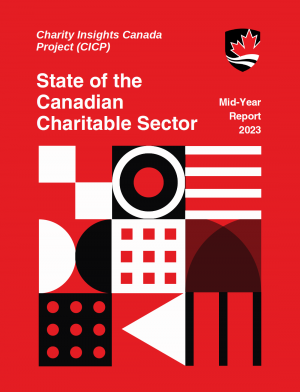 The State of the Canadian Charitable Sector 2023 Mid-Year Report, from the Charity Insights Canada Project (CICP) / Projet Canada Perspectives des Organismes de Bienfaisance (PCPOB), summarizes two dozen weekly surveys of approximately 1,000 registered charities between December 2022 and June 2023. Findings include: (1) charities are seeing rises in demand and increases in costs associated with their services, impacting organizations’ abilities to support and retain personnel; (2) charities are embracing equity, diversity, and inclusion (EDI initiatives, striving to realize representative demographics within their workplaces; and (3) certain disparities, particularly in gender representation, underscore the necessity for heightened awareness and targeted action in specific leadership roles. Click here for the CICP-PCPOB’s State of the Canadian Charitable Sector 2023 Mid-Year Report.
The State of the Canadian Charitable Sector 2023 Mid-Year Report, from the Charity Insights Canada Project (CICP) / Projet Canada Perspectives des Organismes de Bienfaisance (PCPOB), summarizes two dozen weekly surveys of approximately 1,000 registered charities between December 2022 and June 2023. Findings include: (1) charities are seeing rises in demand and increases in costs associated with their services, impacting organizations’ abilities to support and retain personnel; (2) charities are embracing equity, diversity, and inclusion (EDI initiatives, striving to realize representative demographics within their workplaces; and (3) certain disparities, particularly in gender representation, underscore the necessity for heightened awareness and targeted action in specific leadership roles. Click here for the CICP-PCPOB’s State of the Canadian Charitable Sector 2023 Mid-Year Report.
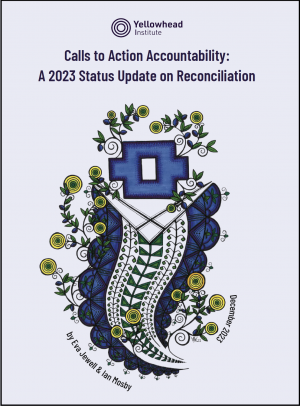 Eighty-one out of 94 Calls to Action remain unfulfilled eight years after the Truth and Reconciliation Commission of Canada released its final report, Honouring the Truth, Reconciling for the Future (2015). This year, Yellowhead Institute’s Calls to Action Accountability: A 2023 Status Update on Reconciliation explains the inaction and what it means for the future. For example, the authors, Eva Jewell and Ian Mosby, identify five challenges: (1) paternalism; (2) structural anti-Indigenous discrimination; (3) exploiting Indigenous land in “the public interest”; (4) insufficient resources; and (5) performative measures and actions, as in the case of “economic reconciliation,” that serve as window dressing to manage Canada’s reputation. And the authors explain that when there is concrete action, such as the $23 billion settlement for Indigenous children and their families, “it doesn’t come from Canada (which can’t manage a single Call to Action in a year) but from Indigenous peoples, who fiercely advocate for themselves and resist the full weight of Canadian intransigence.” This special report from Yellowhead Institute is a must read.
Eighty-one out of 94 Calls to Action remain unfulfilled eight years after the Truth and Reconciliation Commission of Canada released its final report, Honouring the Truth, Reconciling for the Future (2015). This year, Yellowhead Institute’s Calls to Action Accountability: A 2023 Status Update on Reconciliation explains the inaction and what it means for the future. For example, the authors, Eva Jewell and Ian Mosby, identify five challenges: (1) paternalism; (2) structural anti-Indigenous discrimination; (3) exploiting Indigenous land in “the public interest”; (4) insufficient resources; and (5) performative measures and actions, as in the case of “economic reconciliation,” that serve as window dressing to manage Canada’s reputation. And the authors explain that when there is concrete action, such as the $23 billion settlement for Indigenous children and their families, “it doesn’t come from Canada (which can’t manage a single Call to Action in a year) but from Indigenous peoples, who fiercely advocate for themselves and resist the full weight of Canadian intransigence.” This special report from Yellowhead Institute is a must read.
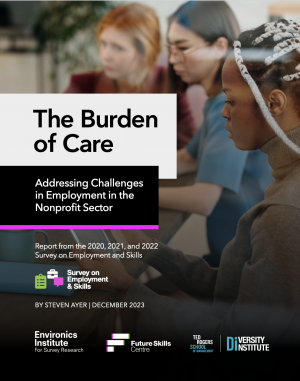 The Burden of Care: Addressing Challenges in Employment in the Nonprofit Sector (Dec. 2023) is a report from the Environics Institute for Survey Research, in partnership with the Future Skills Centre and the Diversity Institute at Toronto Metropolitan University. The report is based on the 2020, 2021 and 2022 Survey on Employment and Skills (funded primarily by the Government of Canada’s Future Skills Centre), using results from 639 respondents who worked in the nonprofit sector and more than 11,000 respondents who worked in the public and private sectors. The report concludes that workers in the nonprofit sector have lower job satisfaction than workers in either the public or private sectors. Nonprofit sector jobs are also quite precarious, with high rates of temporary and part-time employment, including many workers who are involuntarily part-time. Download the report here.
The Burden of Care: Addressing Challenges in Employment in the Nonprofit Sector (Dec. 2023) is a report from the Environics Institute for Survey Research, in partnership with the Future Skills Centre and the Diversity Institute at Toronto Metropolitan University. The report is based on the 2020, 2021 and 2022 Survey on Employment and Skills (funded primarily by the Government of Canada’s Future Skills Centre), using results from 639 respondents who worked in the nonprofit sector and more than 11,000 respondents who worked in the public and private sectors. The report concludes that workers in the nonprofit sector have lower job satisfaction than workers in either the public or private sectors. Nonprofit sector jobs are also quite precarious, with high rates of temporary and part-time employment, including many workers who are involuntarily part-time. Download the report here.
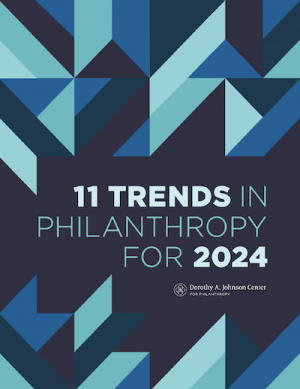 The US-based Dorothy A. Johnson Center for Philanthropy released its annual trends report, 11 Trends in Philanthropy for 2024, a detailed analysis of philanthropy as it relates to: (1) the “increase of incarcerated students enrolled in higher education;” (2) philanthropy as it relates to “Asian American and Pacific Islander Communities;” (3) philanthropy as it relates to the southern US; and (4) “With Crisis Comes Change: Black Women and the Glass Cliff.” For the other seven trends, download the full, 11-trend report here.
The US-based Dorothy A. Johnson Center for Philanthropy released its annual trends report, 11 Trends in Philanthropy for 2024, a detailed analysis of philanthropy as it relates to: (1) the “increase of incarcerated students enrolled in higher education;” (2) philanthropy as it relates to “Asian American and Pacific Islander Communities;” (3) philanthropy as it relates to the southern US; and (4) “With Crisis Comes Change: Black Women and the Glass Cliff.” For the other seven trends, download the full, 11-trend report here.
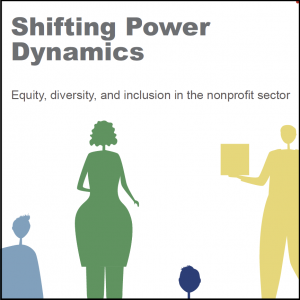 Shifting Power Dynamics: Equity, Diversity, and Inclusion in the Nonprofit Sector (2023) is a 62-page slideshow that summarizes results from a survey of 1,655 charities and nonprofit groups. Led by the Equitable Recovery Collective and Imagine Canada, the report explores what Canadian charities and nonprofits are doing to advance equity, diversity, and inclusion (EDI) within their organizations. One finding: despite experiencing increased expectations and facing greater barriers, organizations with leadership from Black, Indigenous, racialized communities and other underrepresented groups are doing more than their white-led counterparts to advance EDI in the sector.
Shifting Power Dynamics: Equity, Diversity, and Inclusion in the Nonprofit Sector (2023) is a 62-page slideshow that summarizes results from a survey of 1,655 charities and nonprofit groups. Led by the Equitable Recovery Collective and Imagine Canada, the report explores what Canadian charities and nonprofits are doing to advance equity, diversity, and inclusion (EDI) within their organizations. One finding: despite experiencing increased expectations and facing greater barriers, organizations with leadership from Black, Indigenous, racialized communities and other underrepresented groups are doing more than their white-led counterparts to advance EDI in the sector.
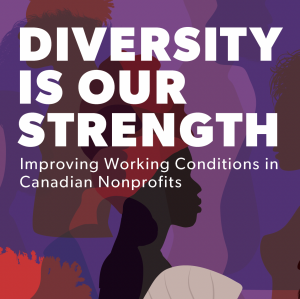 Data from Diversity Is Our Strength: Improving Working Conditions in Canadian Nonprofits, from Imagine Canada (2022), demonstrates that our sector’s workforce is diverse but undervalued: 77% of nonprofit workers are women; 47% are immigrants; and 35% of the workforce is Indigenous and racialized. And workers tend to be older and better educated than the economy-wide averages, but they face lower salaries and difficult employment conditions. The report lists the immediate action needed from funders, governments and nonprofit leaders.
Data from Diversity Is Our Strength: Improving Working Conditions in Canadian Nonprofits, from Imagine Canada (2022), demonstrates that our sector’s workforce is diverse but undervalued: 77% of nonprofit workers are women; 47% are immigrants; and 35% of the workforce is Indigenous and racialized. And workers tend to be older and better educated than the economy-wide averages, but they face lower salaries and difficult employment conditions. The report lists the immediate action needed from funders, governments and nonprofit leaders.
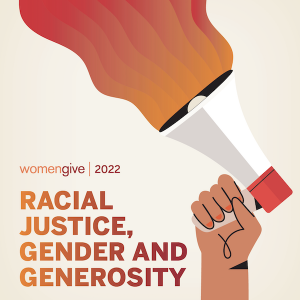 Women have become ever more influential in philanthropy, and they give differently than men. Women Give 2022: Racial Justice, Gender and Generosity (2022) is a report from the Women’s Philanthropy Institute, at Indiana University’s Lilly Family School of Philanthropy, that analyzes how U.S. households, and particularly women, supported racial justice causes. About one in seven U.S. households gave money to support racial justice causes and organizations in 2020, and single women were more likely to give to these causes than single men or couples. And women are more likely than men to “view all of their resources—not just their money but also their time, expertise, and networks—as tools with which to do good.” The greater likelihood of women to contribute their time and talent, as well as money, has also been found in Canada, although we don’t have good data on giving to racial justice causes.
Women have become ever more influential in philanthropy, and they give differently than men. Women Give 2022: Racial Justice, Gender and Generosity (2022) is a report from the Women’s Philanthropy Institute, at Indiana University’s Lilly Family School of Philanthropy, that analyzes how U.S. households, and particularly women, supported racial justice causes. About one in seven U.S. households gave money to support racial justice causes and organizations in 2020, and single women were more likely to give to these causes than single men or couples. And women are more likely than men to “view all of their resources—not just their money but also their time, expertise, and networks—as tools with which to do good.” The greater likelihood of women to contribute their time and talent, as well as money, has also been found in Canada, although we don’t have good data on giving to racial justice causes.
 In June 2022, Canada adopted a new version of the Income Tax Act (ITA). Unpacking Charitable Law Modernization (Jan. 2024) is a series of reports and articles (some in French and some in English) from PhiLab about the modernization of the law, both in Canada and abroad. The report focuses on policies for social and environmental justice, innovative approaches and policies for the philanthropic sector, impacts of the increase in the disbursement quota and the relaxation of rules concerning the allocation of funds to non-qualified donees, and projects that are still pending and not currently covered by the new version of the ITA. The link to the series is here.
In June 2022, Canada adopted a new version of the Income Tax Act (ITA). Unpacking Charitable Law Modernization (Jan. 2024) is a series of reports and articles (some in French and some in English) from PhiLab about the modernization of the law, both in Canada and abroad. The report focuses on policies for social and environmental justice, innovative approaches and policies for the philanthropic sector, impacts of the increase in the disbursement quota and the relaxation of rules concerning the allocation of funds to non-qualified donees, and projects that are still pending and not currently covered by the new version of the ITA. The link to the series is here.
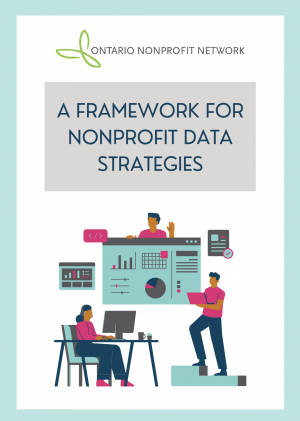 Nonprofits organizations and collectives need support to build their own data strategies, as well as their own data and data policies. A Framework for Nonprofit Data Strategies (2023), from the Ontario Nonprofit Network, can be used by nonprofits that are curious about data and would like to explore its applications to their work. The report is also intended for government and non-governmental funders, policymakers, academics and researchers who are interested in supporting the nonprofit sector as a partner in the data ecosystem. Click here for the publication.
Nonprofits organizations and collectives need support to build their own data strategies, as well as their own data and data policies. A Framework for Nonprofit Data Strategies (2023), from the Ontario Nonprofit Network, can be used by nonprofits that are curious about data and would like to explore its applications to their work. The report is also intended for government and non-governmental funders, policymakers, academics and researchers who are interested in supporting the nonprofit sector as a partner in the data ecosystem. Click here for the publication.
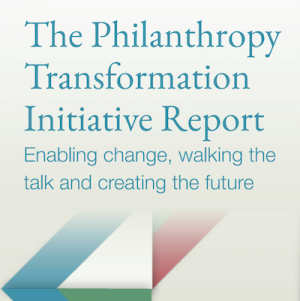 The Philanthropy Transformation Initiative Report: Enabling Change, Walking the Talk and Creating the Future (2023) outlines 10 core principles for driving transformative change in foundations and philanthropic support organizations. Published by WINGS, with the support of the Centre for Strategic Philanthropy, at Cambridge University. WINGS is a global network of more than 200 philanthropy associations, networks, academic institutions, support organizations and funders in 58 countries, all of whom are committed to strengthening philanthropy.
The Philanthropy Transformation Initiative Report: Enabling Change, Walking the Talk and Creating the Future (2023) outlines 10 core principles for driving transformative change in foundations and philanthropic support organizations. Published by WINGS, with the support of the Centre for Strategic Philanthropy, at Cambridge University. WINGS is a global network of more than 200 philanthropy associations, networks, academic institutions, support organizations and funders in 58 countries, all of whom are committed to strengthening philanthropy.
 What does a world-leading framework of charities law look like? (2022), by Sue Barker, draws on experiences in Canada, New Zealand and other countries to dive into regulation, contracting, advocacy and a whole lot more. Barker’s 600-page report (pdf here) builds on two decades of her legal practice in charities law — and makes 70 recommendations, many of which apply to Canada.
What does a world-leading framework of charities law look like? (2022), by Sue Barker, draws on experiences in Canada, New Zealand and other countries to dive into regulation, contracting, advocacy and a whole lot more. Barker’s 600-page report (pdf here) builds on two decades of her legal practice in charities law — and makes 70 recommendations, many of which apply to Canada.
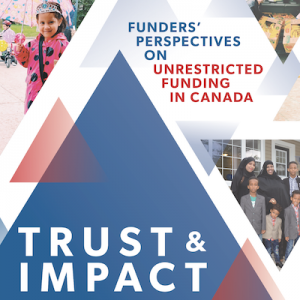 Trust & Impact, from Imagine Canada in 2022, reports on past causes of reduced unrestricted funding and how it increased quickly in Canada after the pandemic started. Through interviews with two dozen Canadian funders, the report provides an in-depth analysis of the state of unrestricted funding in Canada today.
Trust & Impact, from Imagine Canada in 2022, reports on past causes of reduced unrestricted funding and how it increased quickly in Canada after the pandemic started. Through interviews with two dozen Canadian funders, the report provides an in-depth analysis of the state of unrestricted funding in Canada today.
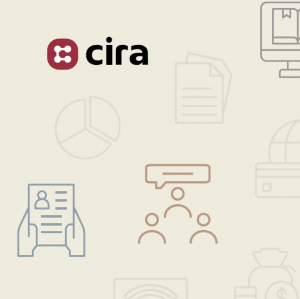 Millions of Canadians don’t have an internet connection, and of those who do, only half of rural households and just a third of First Nation households have access to basic download speed targets of 50 megabits per second (Mbps) and 10 Mbps upload. The Canadian Internet Registration Authority (CIRA) is addressing this digital inequity. CIRA manages the .CA internet domain and happens to be one of the few, non-governmental, digital-funding programs in the country — and it just released “How To Fund Digital Equity In Canada: A Guide for Funders” (2022).
Millions of Canadians don’t have an internet connection, and of those who do, only half of rural households and just a third of First Nation households have access to basic download speed targets of 50 megabits per second (Mbps) and 10 Mbps upload. The Canadian Internet Registration Authority (CIRA) is addressing this digital inequity. CIRA manages the .CA internet domain and happens to be one of the few, non-governmental, digital-funding programs in the country — and it just released “How To Fund Digital Equity In Canada: A Guide for Funders” (2022).
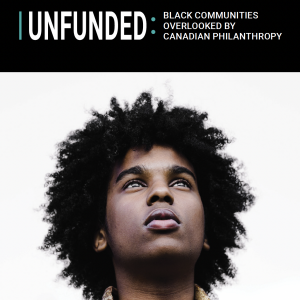 Carleton University PhD student Fahad Ahmad and MPNL alumna Rachel Pereira helped to produce a new report, Unfunded: Black Communities Overlooked by Canadian Philanthropy (in English and French). Prepared by the Network for the Advancement of Black Communities and Carleton’s MPNL program, the report provides the first in-depth examination of the relationship between Canadian philanthropy and Black communities
Carleton University PhD student Fahad Ahmad and MPNL alumna Rachel Pereira helped to produce a new report, Unfunded: Black Communities Overlooked by Canadian Philanthropy (in English and French). Prepared by the Network for the Advancement of Black Communities and Carleton’s MPNL program, the report provides the first in-depth examination of the relationship between Canadian philanthropy and Black communities
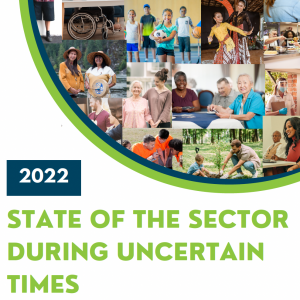 Nonprofits in Ontario are facing increased demands for services, as well as inflation, deepening financial precarity, and a staffing/volunteer crisis. In 2022, the Ontario Nonprofit Network (ONN) and l’Assemblée de la Francophonie de l’Ontario (AFO) surveyed 1,500 charities and discovered there’s an urgent need for a coordinated sector response and long-term public policy solutions to not only mitigate challenges that nonprofits are facing, but to prepare for future emergencies. 2022 State of the Sector – Policy Report contains their findings.
Nonprofits in Ontario are facing increased demands for services, as well as inflation, deepening financial precarity, and a staffing/volunteer crisis. In 2022, the Ontario Nonprofit Network (ONN) and l’Assemblée de la Francophonie de l’Ontario (AFO) surveyed 1,500 charities and discovered there’s an urgent need for a coordinated sector response and long-term public policy solutions to not only mitigate challenges that nonprofits are facing, but to prepare for future emergencies. 2022 State of the Sector – Policy Report contains their findings.
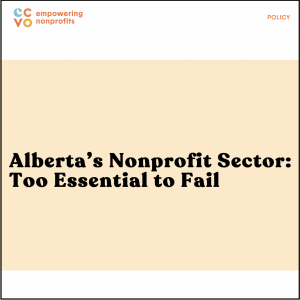 The Calgary Chamber of Voluntary Organizations (CCVO) conducted a survey of 331 Alberta nonprofits and engaged in a literature review to better understand the impacts of the pandemic on the nonprofit sector. Its report, Alberta’s Nonprofit Sector: Too Essential to Fail, synthesizes findings, revealing a sector that is under strain and undervalued.
The Calgary Chamber of Voluntary Organizations (CCVO) conducted a survey of 331 Alberta nonprofits and engaged in a literature review to better understand the impacts of the pandemic on the nonprofit sector. Its report, Alberta’s Nonprofit Sector: Too Essential to Fail, synthesizes findings, revealing a sector that is under strain and undervalued.
 Giving at a Crossroads: Generational Trends, Pandemic Uncertainties, and Unprecedented Strain on Charities. This 2022 edition of “The Giving Report,” from CanadaHelps, notes that the giving gap continues to widen (with an increased reliance on a smaller group of aging donors), but that younger generations do give and want to give more — and they have high levels of trust in charities.
Giving at a Crossroads: Generational Trends, Pandemic Uncertainties, and Unprecedented Strain on Charities. This 2022 edition of “The Giving Report,” from CanadaHelps, notes that the giving gap continues to widen (with an increased reliance on a smaller group of aging donors), but that younger generations do give and want to give more — and they have high levels of trust in charities.
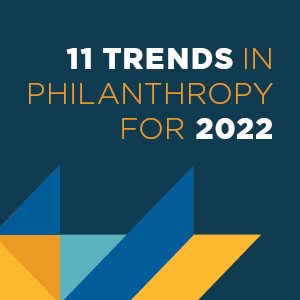 The Dorothy A. Johnson Center for Philanthropy, in the U.S., published 11 Trends in Philanthropy for 2022, which examines how nonprofits can use the growing market of cryptocurrencies, how the culture wars are affecting philanthropy, and how nonprofits can reverse the trend of declining financial donations.
The Dorothy A. Johnson Center for Philanthropy, in the U.S., published 11 Trends in Philanthropy for 2022, which examines how nonprofits can use the growing market of cryptocurrencies, how the culture wars are affecting philanthropy, and how nonprofits can reverse the trend of declining financial donations.
 Getting Connected: Funders and Digital Equity in Canada (2022), by CIRA.ca, the nonprofit that manages the .CA domain. Many Canadians still lack the speeds and skills to participate in an increasingly digital world. Based on interviews with 20 leaders in Canada’s philanthropic community, this new report shows that funders are feeling an urgency to tackle the country’s digital inequities.
Getting Connected: Funders and Digital Equity in Canada (2022), by CIRA.ca, the nonprofit that manages the .CA domain. Many Canadians still lack the speeds and skills to participate in an increasingly digital world. Based on interviews with 20 leaders in Canada’s philanthropic community, this new report shows that funders are feeling an urgency to tackle the country’s digital inequities.
 Are Canada’s Charities Ready for Digital Transformation? (2021), from CanadaHelps, presents results from a survey of 1,400 Canadian charities, including baseline data on charities’ unreadiness related to digital tools and the barriers they face in digital adoption. It shows they lack the funding and skills to maintain relevancy, and calls for urgent investment by funders and governments. The 32-page can be downloaded from CanadaHelps’ website.
Are Canada’s Charities Ready for Digital Transformation? (2021), from CanadaHelps, presents results from a survey of 1,400 Canadian charities, including baseline data on charities’ unreadiness related to digital tools and the barriers they face in digital adoption. It shows they lack the funding and skills to maintain relevancy, and calls for urgent investment by funders and governments. The 32-page can be downloaded from CanadaHelps’ website.
 The Giving Report 2021, by CanadaHelps (April 2021), shows how and where online giving accelerated at record rates in 2020 even as total giving in Canada likely declined to 2016 levels. Produced in collaboration with Environics Analytics, the Giving Report includes trends, analysis and data from 1.1 million Canadians who donated via CanadaHelps.
The Giving Report 2021, by CanadaHelps (April 2021), shows how and where online giving accelerated at record rates in 2020 even as total giving in Canada likely declined to 2016 levels. Produced in collaboration with Environics Analytics, the Giving Report includes trends, analysis and data from 1.1 million Canadians who donated via CanadaHelps.
 Steven Ayer, of Imagine Canada, published Wake Up Call: Navigating New Pathways for Corporate Community Investment in Canada (Nov. 2020), an assessment of the social shifts that Canada is experiencing and how nonprofits and corporations can more effectively work together to address them.
Steven Ayer, of Imagine Canada, published Wake Up Call: Navigating New Pathways for Corporate Community Investment in Canada (Nov. 2020), an assessment of the social shifts that Canada is experiencing and how nonprofits and corporations can more effectively work together to address them.
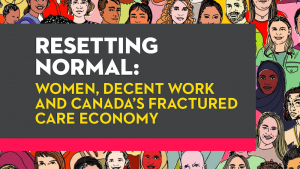 Resetting Normal: Funding a Thriving Women’s Sector and Resetting Normal: Women, Decent Work and Canada’s Fractured Care Economy, two reports (2020) by the Canadian Women’s Foundation, Ontario Nonprofit Network, Canadian Centre for Policy Alternatives, and Kathleen Lahey and Fran Faraday, show how to redesign funding models, better use gender-based analysis and reinvent our care infrastructure.
Resetting Normal: Funding a Thriving Women’s Sector and Resetting Normal: Women, Decent Work and Canada’s Fractured Care Economy, two reports (2020) by the Canadian Women’s Foundation, Ontario Nonprofit Network, Canadian Centre for Policy Alternatives, and Kathleen Lahey and Fran Faraday, show how to redesign funding models, better use gender-based analysis and reinvent our care infrastructure.
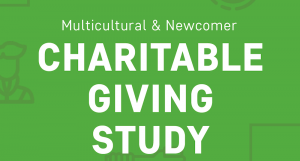 The study by Imagine Canada (2020) contains analyses from a survey of 3,130 newcomers and second-generation Canadians from South Asian, Chinese, Afro-Caribbean/African, Filipino, Arab, and Iranian backgrounds. Findings include trends about causes supported, giving methods, motivations for support, and insights.
The study by Imagine Canada (2020) contains analyses from a survey of 3,130 newcomers and second-generation Canadians from South Asian, Chinese, Afro-Caribbean/African, Filipino, Arab, and Iranian backgrounds. Findings include trends about causes supported, giving methods, motivations for support, and insights.
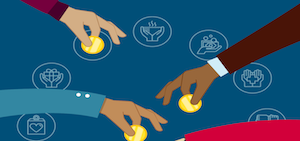 This report, Taxation and Philanthropy, from the Organisation for Economic Co-operation and Development (Nov. 2020), is a valuable resource for understanding how different countries treat philanthropy in their tax systems. It provides an overview of how 40 OECD countries tax philanthropy and provide tax incentives for giving. Also, as part of an international conference to release the report, Calum Carmichael presented his paper, Charitable ends by political means?, comparing 16 countries’ approaches in regulating the kinds and levels of political activities that philanthropic entities could undertake without losing their fiscal privileges.
This report, Taxation and Philanthropy, from the Organisation for Economic Co-operation and Development (Nov. 2020), is a valuable resource for understanding how different countries treat philanthropy in their tax systems. It provides an overview of how 40 OECD countries tax philanthropy and provide tax incentives for giving. Also, as part of an international conference to release the report, Calum Carmichael presented his paper, Charitable ends by political means?, comparing 16 countries’ approaches in regulating the kinds and levels of political activities that philanthropic entities could undertake without losing their fiscal privileges.
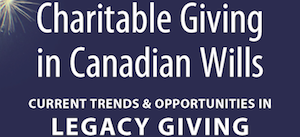 Only 5% of Canadians leave a charitable gift in their wills, far fewer than in the US or Australia. From the Canadian Association of Gift Planners and Environics Analytics, this is the first report (2020) that analyzes the reasons, misperceptions and barriers related to bequests in Canada – and how fundraisers and philanthropic advisors can encourage Canadians to be more generous.
Only 5% of Canadians leave a charitable gift in their wills, far fewer than in the US or Australia. From the Canadian Association of Gift Planners and Environics Analytics, this is the first report (2020) that analyzes the reasons, misperceptions and barriers related to bequests in Canada – and how fundraisers and philanthropic advisors can encourage Canadians to be more generous.
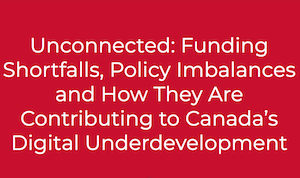 The Canadian Internet Registration Authority (CIRA) is a nonprofit best known for managing the .CA internet domain. It issued a research report, Unconnected, in Oct. 2020, that shows that digital development in Canada is underfunded, piecemeal, ad hoc and unorganized, despite stakeholders sharing many of the same goals. It suggests potential actions to address and correct Canada’s digital underdevelopment.
The Canadian Internet Registration Authority (CIRA) is a nonprofit best known for managing the .CA internet domain. It issued a research report, Unconnected, in Oct. 2020, that shows that digital development in Canada is underfunded, piecemeal, ad hoc and unorganized, despite stakeholders sharing many of the same goals. It suggests potential actions to address and correct Canada’s digital underdevelopment.
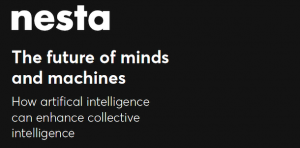 Artificial intelligence is widely predicted to transform the nonprofit sector, but how? What actually is AI — and what is its potential and its potential problems? This paper from Aleks Berditchevskaia and Peter Baeck, of NESTA, a UK-based foundation, offers a readable overview of AI and how it can be used for problem-solving and large-scale, participatory projects.
Artificial intelligence is widely predicted to transform the nonprofit sector, but how? What actually is AI — and what is its potential and its potential problems? This paper from Aleks Berditchevskaia and Peter Baeck, of NESTA, a UK-based foundation, offers a readable overview of AI and how it can be used for problem-solving and large-scale, participatory projects.
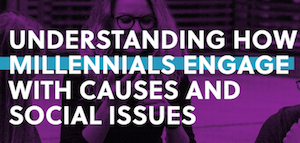 Millennials (born 1980-2000) are the largest, most diverse cohort in U.S. history, and their impact on philanthropy, activism and leadership in the nonprofit sector is already profound. In the absence of accessible, comprehensive Canadian data, we turn to this US report from Achieve and the Case Foundation in 2020. It surveyed more than 150,000 Millennials over ten years, making it the largest body of data about this group.
Millennials (born 1980-2000) are the largest, most diverse cohort in U.S. history, and their impact on philanthropy, activism and leadership in the nonprofit sector is already profound. In the absence of accessible, comprehensive Canadian data, we turn to this US report from Achieve and the Case Foundation in 2020. It surveyed more than 150,000 Millennials over ten years, making it the largest body of data about this group.
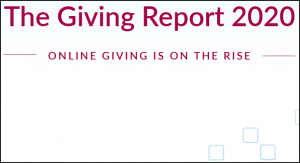 This report by CanadaHelps.org contains new data and analyses showing that, while fewer Canadians are donating, online giving grew rapidly in 2017-2019. The annual report provides knowledge and insights to help Canadians understand the charitable sector and its impact on Canada.
This report by CanadaHelps.org contains new data and analyses showing that, while fewer Canadians are donating, online giving grew rapidly in 2017-2019. The annual report provides knowledge and insights to help Canadians understand the charitable sector and its impact on Canada.
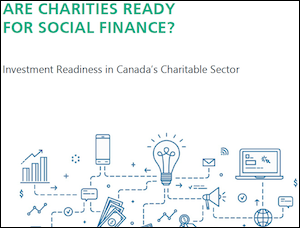 Are Charities Ready for Social Finance? is by Adam Jog, Imagine Canada (2020). This is the first survey (of more than 1,000 Canadian charities) about the barriers to engagement with social finance tools. It provides fresh insights for identifying those parts of the charitable sector likely to contain ready participants, those that will need assistance to engage, and those for which social finance is likely not a good fit.
Are Charities Ready for Social Finance? is by Adam Jog, Imagine Canada (2020). This is the first survey (of more than 1,000 Canadian charities) about the barriers to engagement with social finance tools. It provides fresh insights for identifying those parts of the charitable sector likely to contain ready participants, those that will need assistance to engage, and those for which social finance is likely not a good fit.
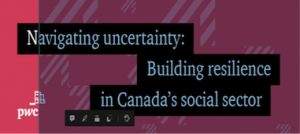 Navigating uncertainty, a report from PricewaterhouseCoopers (PwC), in English and French (Nov. 2020), provides insights for recovery and interviews with 548 sector leaders who stress the need to invest in upskilling and digital, collaborative strategies. The business case for such investment is clear, but the focus is still on short-term risk. This PwC report is a checklist that will help boards of directors to shift, empower and future fit their organizations.
Navigating uncertainty, a report from PricewaterhouseCoopers (PwC), in English and French (Nov. 2020), provides insights for recovery and interviews with 548 sector leaders who stress the need to invest in upskilling and digital, collaborative strategies. The business case for such investment is clear, but the focus is still on short-term risk. This PwC report is a checklist that will help boards of directors to shift, empower and future fit their organizations.
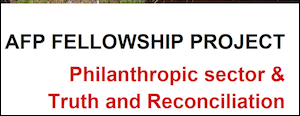 After the Truth and Reconciliation Commission, in Canada, philanthropic foundations signed a Declaration of Action, but progress has been mixed since then. A 2019 report from Sharon Redsky (during a fellowship with the Association of Fundraising Professionals) assesses the challenges and suggests ways forward. Download here: http://www.afpinclusivegiving.ca/wp-content/uploads/2019/03/Sharon-Redsky-Final-Project.pdf.
After the Truth and Reconciliation Commission, in Canada, philanthropic foundations signed a Declaration of Action, but progress has been mixed since then. A 2019 report from Sharon Redsky (during a fellowship with the Association of Fundraising Professionals) assesses the challenges and suggests ways forward. Download here: http://www.afpinclusivegiving.ca/wp-content/uploads/2019/03/Sharon-Redsky-Final-Project.pdf.
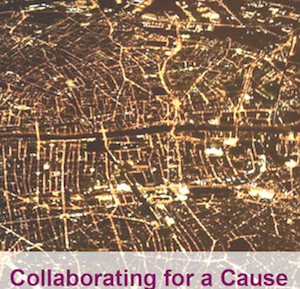 Collaboration has become the new norm in philanthropy and among nonprofits, but as anyone who has tried to build collaborative, cause-related networks knows, it isn’t easy. Collaborating for a cause: How cause-related networks multiply the impact of philanthropy, a report from NPC (Consulting), in the UK, provides valuable recommendations and case studies of network building that are applicable in Canada.
Collaboration has become the new norm in philanthropy and among nonprofits, but as anyone who has tried to build collaborative, cause-related networks knows, it isn’t easy. Collaborating for a cause: How cause-related networks multiply the impact of philanthropy, a report from NPC (Consulting), in the UK, provides valuable recommendations and case studies of network building that are applicable in Canada.
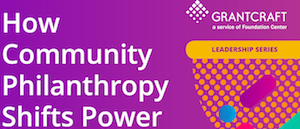 This essential guide from Jenny Hodgson and Anna Pond advances models of community philanthropy that shift power. The report offers advice to foundations and other funders on how to be constructive players in this movement, and advice to community leaders as to what to ask of funders. This is a 2018 report that’s an MPNL favourite.
This essential guide from Jenny Hodgson and Anna Pond advances models of community philanthropy that shift power. The report offers advice to foundations and other funders on how to be constructive players in this movement, and advice to community leaders as to what to ask of funders. This is a 2018 report that’s an MPNL favourite.
Archive of reports about Covid's impact on the sector.
Banner photo is courtesy of Dong Seok Jeong.
Wednesday, April 2, 2025 in Archive of Top Reports about Our Sector
Share: Twitter, Facebook



